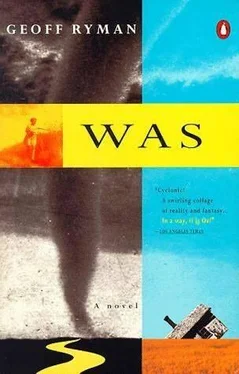He held up the book called Redhouse , like Red Indians, and he said, "And this is the Oz-English Dictionary."
The Substitute got bored just as quickly as the children did. The fire for Oz went out of his eyes, and he began to talk about other things. He told them the story of his play. He told them how it had run out of money, and how he was now "resting." They chuckled at his joke. "Mind you, actors are always resting. That is the attraction of the profession."
The class tested him. They mocked his New York accent. "I say, I am an actor from Noo Yawk."
He laughed. They waited. It wasn't a false laugh-that would have showed he was pretending to think it was funny so he wouldn't have to do anything about it. He didn't imitate them back, so he wasn't sarcastic or mean. And he didn't tell them it was wrong to make fun of people just because they were different, so he wasn't a pompous fool. Instead, he genuinely seemed to think it was funny.
He laughed and looked a bit mystified.
"Why," he asked, "is it that people laugh?" He asked it in wonder.
Was it a trick question? It seemed to be a pretty dumb one.
"Cause something's funny?" ventured one of the girls.
"Yes, but what do we mean by funny? I mean, what is funny?"
It was the sort of question a little kid about five would ask. Unanswerable. It was a real question, one the Substitute himself had no answer for.
Suddenly the Substitute was looking at Dorothy. He remembered her question about Indians, about home. It was as if he had recognized a kindred spirit. The look he gave her was questioning. He wanted a mystery solved, and he wanted to know more about her. The look, confiding and sincere, alarmed Dorothy. It was not unlike the look that Uncle Henry gave her.
"Dorothy," the Substitute asked. "Why do people laugh?"
"To show who's boss," said Dorothy Gael.
The smile of the Substitute slipped. "Yes, but for what other reason?"
Dorothy considered. "Sometimes it scares people."
"But your parents, why do they laugh?"
"My parents are dead," said Dorothy.
The nice squirrel looked stricken. "I'm so sorry."
"Why?" asked Dorothy. She was suddenly impatient with the Substitute. "I'm not sorry. Can't hardly even remember them. Nobody laughs around our place anyway."
"Nobody laughs?"
"Life's too hard," shrugged Dorothy. She wanted to shrug away her love of him. She hated his dazzle. The love hurt. "The hogs don't laugh, why should we?"
You stupid squirrel, Dorothy thought. You got a face like a pillow.
"That's a terrible thing," said the Substitute.
"Shut up," said Dorothy.
"Dorothy," said the Substitute, "that's very rude."
"Shut your squirrel's face up," said Dorothy. Is that rude enough for you to get my meaning?
The Substitute looked straight at her and looked sad and wise, and he smiled. "You're too old for this class, aren't you, Miss Gael?"
That made Dorothy afraid. The fear gathered strength and speed like a rockface slipping from a mountain. Dorothy was stricken with terror. No, she thought, I'm not old, I'm not too old.
The Substitute thought she was surprised at being treated with courtesy. He thought, quite rightly, that no one had ever been courteous to Dorothy before, but it was fear that made her go still. Dorothy was realizing that at nearly thirteen, she was almost an adult. At fifteen, two years from then, she would leave and go to work. As a child, she had power. She knew that as an adult, fat and ugly and slumped in dirty clothes, she would have none. Her childhood was almost over and she could not remember ever being happy.
"Could you do something for me, Miss Gael? Would you mind leaving the class?"
Dorothy began to grin a crooked grin. Oh, yes, you want to get rid of me that easily?
But he held up a hand. "I've got an idea for an assignment that I want you to work on. I want you to go into the bookroom and just sit quietly and write something. It doesn't have to be long. But it can be about anything you like. Anything at all."
Dorothy stood up, still grinning crookedly. She had been cast out before. She took pencil and paper. "I'd do anything to get out of here," she said.
"Thank you, Miss Gael. Take as long as you like."
Outside, Dorothy thought: So why on earth should I go to the bookroom? Stupid squirrel. Stupid groundhog.
Then she thought: Where else do I have to go? Only home. And I don't want to go home. I hate home. I'd rather stay here, but I hate it here, and everyone here hates me. I hate everybody and everything.
She went to the bookroom. Mrs. Warren glared at her. "Teacher sent me here," said Dorothy. There was one table and shelves of spare textbooks. Proud as they were of their schools, even the people of Kansas could not call this a library.
But it still smelled of books and varnish and sunlight. Sunlight came through the window, fierce and hot, Kansas sunlight, parching. It was warm and airless, and Dorothy felt sleepy. She wished she had come here before, to lay down all her cares. She bowed her head, to the table. She wanted to stay just here, in this one place, and never leave it.
Write something, he had said. Write about what? Write about all the kids who hate me? Write about how stupid little Emma is and how she follows me around because I scare people? Shall I write about how I am God's worst sinner, and how I know I am going to go to Hell and that that is the only reason I don't kill myself, because I see the Devil when I sleep at night, and that I smell Uncle Henry around my mouth all day long, and that nobody loves me. Not even God. Should I write that God doesn't love me? Or do I write about how beautiful you are and how I know how ugly I am and how you could never have anything to do with me?
But she found what she wanted to write about very close to the surface. She wrote about it, weeping. And then she dried her eyes and found she wanted someone to see it, just so that someone would know there was a bit more to Dorothy Gael than blows and bad blood.
She walked back into the classroom, hugging the paper to herself. She walked up to the Substitute's desk.
"That was quick, Miss Gael. Have you written something?"
Wordlessly, she passed it to him, a whole page both sides, and she stood over him and watched him as he read.
What he read was this:
TOTO
I have a little dog called Toto. He is a terrier which means that he has short wiry hair and is gray. He waits for me every day when I come home. When he sees me he comes running. He jumps up and down. He wiggles and nitters and wants me to pet him. I say to him "Good Toto, good boy." And he nitters again because he knows his name. We walk home together. He loves chasing sticks. I throw sticks for him, and he brings them back to me and drops them at my feet. When I throw them, he runs and runs, flat out. He even runs when I don't throw sticks. He runs all over the fields, yipping. It is like he is saying hello to everything. He chases the quail, but he never hurts them. He runs all over the hills. He runs and comes back to me and runs again. I can hear him barking.
I get home and Aunty calls hello and tells me what's for supper and I tell her all the things I did that day. So I fetch the water for Uncle Henry's bath, and Aunty Em says I can go and play with Toto. So we go out into the fields, for hours and hours and I sit down and eat an apple that Aunty Em give me, and Toto and I sit down, on top of a hill where I can see all the farm. Toto sits on my lap, and I scratch his ears and his neck under the collar. He licks my hand, and he goes to sleep on my lap. He has a cold wet nose. He goes to sleep with his nose against my arm. At night, I give him his supper in a red bowl. I fix him oatmeal and egg and a bit of jerky that Aunty lets me have for him.
Читать дальше












